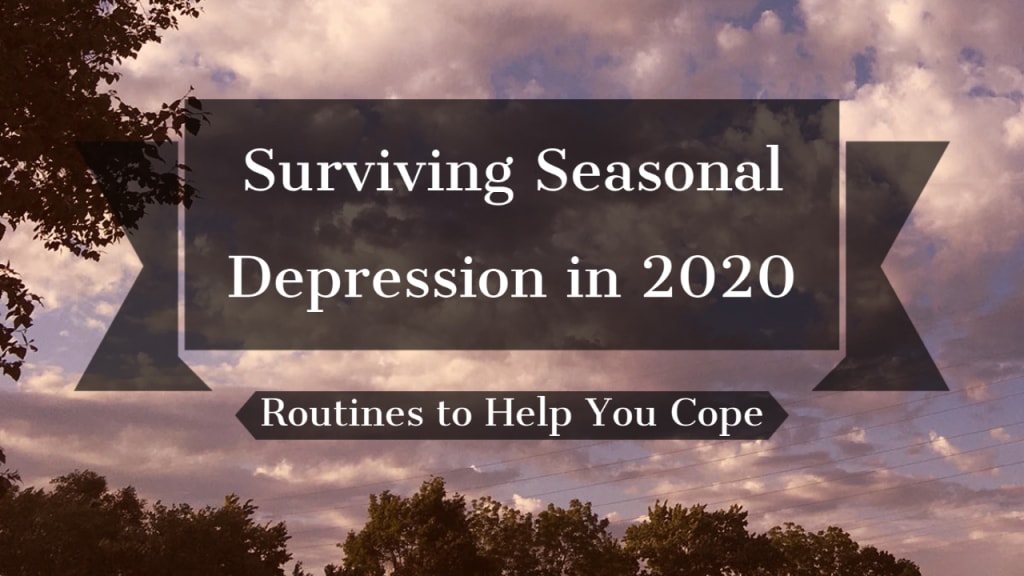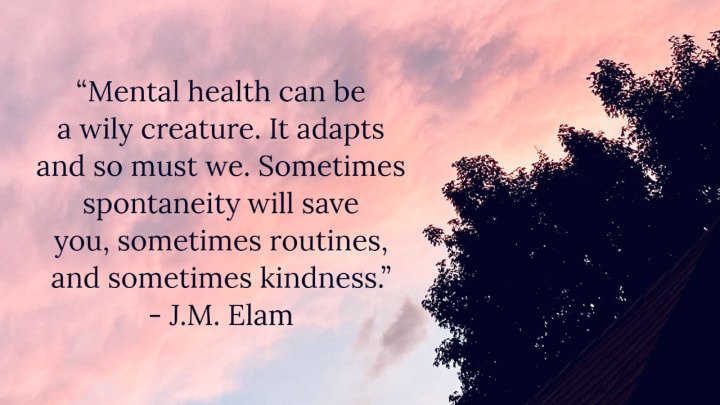
*TW: Mental Health
Congratulations, you’ve survived everything that 2020 has thrown at you so far. It feels like anything could happen next, and a familiar nemesis is on the horizon. Not only could your seasonal depression feel heavier this year, but some of your usual coping mechanisms might not feel available to you.
This only means that we need to get creative and find new ways to survive in the fourth quarter of this year.
These are some of the ways that I’ve learned to survive seasonal depression. Keep what resonates and toss out the rest. We all have different paths through the storm, and I hope that you find yours.
I’ve had days where mitigating circumstances were made worse by the grinding halt I found myself in. I’ve had mornings that weren’t filled with wonder but with dread. Pure exhaustion pinned me to my bed. And sometimes, the routines are what pulled me out of that bed.
1. Find routines that work for you.
I’m not someone that thinks that routines will always save you. Yes, we need spontaneity, too, some way to break out of our everyday drudgery. But sometimes, routines will save you.
We don’t always have the option of spontaneity. But amid our everyday responsibilities, we can cultivate habits that can be sources of self-care and self-love. These intentional habits can create empowerment amid chaos and standstill alike.
If you need medicine and therapy, new routines aren’t replacements for those things.
You can’t have too many self-care tools, and good habits aren’t replacements for essential care like your medicine and therapy. In fact, those things might already be integral routines for your survival.
Don’t discount the importance of anything that has helped rather than harmed you. I have found that when seasonal depression hits me, my daily habits might pull me out of bed and get me to a place where I have the energy for the spontaneous and encouraging activities that we crave.
Mental health, emotional health, and physical health are inarguably important. The energy required to stay healthy in those areas is also quickly depleted in the best of times, let alone this year.
My suggestion is to consider your needs and then intentionally craft a habit that you know will help you recover daily.
2. One significant habit that has helped me is my Quiet Time.
When the light through my window is grey, and all of my plans have either fallen through or are looming like strange malignant beasts, I know that it will feel more manageable after my Quiet Time.
I’ve had some hard winters, where I worked during the daylight hours, and it was nearly always getting dark when I returned home. I had long, lonely seasons when I got home and gave up the day.
For me, Quiet Time is a habit that helps me mentally, emotionally, and physically recharge. You know what you need, but you should also know that you deserve to feel better. You are enough, and you have everything at your disposal to survive. But first, believe me when I tell you that you deserve to be happy. You deserve to survive this year.
3. Take it a step at a time.
Small things can shift my mood. Changing a playlist, getting a shower, or leaving the house to run an errand can pull me into a better place.
Feel a little better, and then a little more. Take one small step, and then another. Small actions can accomplish big things.
So often, on the bad days, having a small routine was what could pull me out of my hole. I knew the result would be good. I knew the task inside and out, all of the small steps that led to the whole.
Motivation to begin Quiet Time could be broken down into, “sit up in bed. Great, now stand up and brush your teeth.” I could take a single step at a time to reach a place of productivity, be spontaneous, or even choose another self-care tool.
The magic of many self-care tools is that they help us to appreciate the present.
4. Try to find gratitude in the present.
You can transform everyday moments, mundane habits, responsibilities, surprises, spontaneity, and even struggle through this type of gratitude.
I’d like you to try an experiment with me.
• First, make the typical gratitude list.
• Next, focus on this moment and think of what you’re thankful for in this space and time alone.
• Finally, focus on this moment and be grateful for it innately, with no reasons and no contrast.
Be intentional with what you do, and it may transform what you find. There are infinite forms of self-care, and they all happen in the present moment.
5. Be willing to do The Work.
If you find something that is challenging you or your beliefs, don’t fight it. Examine the feelings. There might be opportunities to heal yourself or others.
Often this is found in honesty and communication. Speak with kindness and a genuine desire to understand. You might have an opportunity to plant a seed or to confront your own misunderstanding.
There is a strange fear associated with changing our minds, but it also contains innate power. By changing my mind, I have transformed my emotions and my situations.
That being said, sometimes, our seasonal depression, paired with everything else in our lives, will feel too big. That’s okay. It’s okay if today, you don’t have the energy. This is where you can be kind to yourself.
6. Be Kind.
Sometimes when you’re at your worst, you grab for the things that are closest to you. And sometimes we can’t reach at all, and the only weapon we have is to give ourselves grace.
This year has been a “Dark Night of the Soul” for many and an awakening for others.
We’re all learning different things and struggling in our own ways. Give the kindness that you want others to give to you. I’ve seen kindness transform situations and people. There is strange chaos to it, creating unexpected opportunities where none existed.
So often, we need to focus that kindness on ourselves as well. And that can mean checking in with what we need at this moment and being willing to change what we had planned.
7. Be Flexible.
Mental health can be a wily creature. It adapts, and so must we.
Sometimes spontaneity will save you, sometimes routines, and sometimes kindness. But if you’re struggling enough already and don’t know if you’re ready to confront the seasonal monster, I hope some of my weapons will fit into your arsenal.
I’m looking for new ways to help myself as well. If there is something healthy that you do to survive seasonal depression, please let me know.
The way that we survive in 2020 is to be flexible and teachable, willing to shift and change. But it’s also to give ourselves kindness and grace for what we can do today. You’ve survived so far and, you can survive this too!

About the Creator
J.M. Elam
Located in Louisville, Kentucky, J.M. Elam is currently working as an artist and writer. Her passions for learning and personal growth are often motivations for her life and work.






Comments
There are no comments for this story
Be the first to respond and start the conversation.